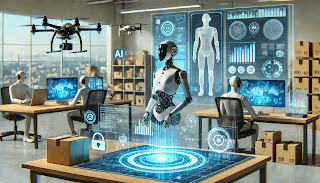Agentic AI: The Rise of Autonomous Systems
Artificial intelligence (AI) is no longer just a tool for automating repetitive tasks—it has evolved into a transformative force, giving rise to autonomous systems capable of operating independently. These intelligent systems, often referred to as Agentic AI, are redefining industries by improving efficiency, enabling complex decision-making, and streamlining workflows. In this blog, we’ll explore how Agentic AI is transforming industries, its applications, challenges, and what the future holds for autonomous systems.
What is Agentic AI?
Agentic AI refers to AI systems designed to act autonomously, make decisions, and perform tasks without constant human intervention. These systems combine technologies such as machine learning, natural language processing (NLP), and reinforcement learning to adapt to evolving environments and handle complex operations. Unlike traditional AI, which depends on static rules, Agentic AI continuously learns and improves based on experience and data.
Core Features of Agentic AI
Autonomy
Operates independently, minimizing the need for human input.
Executes tasks based on pre-set goals while dynamically adapting to changes.
Learns from data to improve performance over time.
Intelligent Decision-Making
Analyzes data and evaluates multiple options before acting.
Utilizes predictive analytics for accurate forecasting.
Adapts strategies based on real-time insights.
Interactivity and Communication
Engages with users through voice or text.
Processes natural language for seamless interactions.
Provides feedback loops to enhance functionality.
Adaptability
Responds to new challenges and adjusts strategies accordingly.
Incorporates feedback for ongoing improvement.
Supports evolving requirements in dynamic environments.
Applications of Agentic AI Across Industries
Healthcare
Medical Diagnostics: AI analyzes medical scans to detect diseases earlier.
Patient Monitoring: Tracks health data and provides timely alerts to doctors.
Drug Discovery: Accelerates the research and testing process for new treatments.
Virtual Health Assistants: Offers personalized health advice and reminders.
Finance
Fraud Prevention: Detects suspicious activities to minimize fraud risks.
Investment Analysis: Optimizes portfolios through data-driven insights.
Automated Trading Systems: Executes trades based on real-time market data.
Financial Chatbots: Assists with banking queries and transactions.
Customer Service
Chatbots and Virtual Assistants: Provides 24/7 support to resolve inquiries.
Sentiment Analysis: Monitors feedback to improve customer satisfaction.
Personalized Recommendations: Suggests products or services based on user preferences.
Workflow Automation: Simplifies repetitive tasks to enhance efficiency.
Manufacturing and Logistics
Predictive Maintenance: Detects equipment failures before they occur.
Supply Chain Optimization: Improves inventory management and delivery schedules.
Robotic Automation: Automates assembly lines and warehouse operations.
Autonomous Vehicles: Powers self-driving trucks and drones for logistics.
Benefits of Agentic AI
Operational Efficiency
Reduces manual effort and automates repetitive processes.
Completes tasks faster with higher precision.
Enhances scalability without proportionally increasing costs.
Cost Savings
Reduces labor expenses by automating tasks.
Minimizes downtime with predictive maintenance.
Optimizes resource utilization to cut operational costs.
Enhanced Decision-Making
Provides actionable insights for informed decisions.
Leverages predictive models for better forecasting.
Reduces bias by relying on data-driven analytics.
User-Centric Experiences
Delivers personalized recommendations and services.
Ensures 24/7 availability through virtual agents.
Maintains consistency across customer touchpoints.
Challenges of Agentic AI
Ethical and Moral Concerns
Raises accountability issues regarding AI decisions.
Requires frameworks to ensure fairness and transparency.
Demands ethical AI practices for deployment.
Data Security and Privacy Risks
Must protect sensitive information against breaches.
Needs robust encryption and compliance with regulations.
Ensures anonymization of data to safeguard privacy.
Reliability and Accuracy
Requires continuous monitoring and updates.
Ensures performance consistency under various conditions.
Minimizes errors through rigorous testing.
Impact on Workforce
May lead to job displacement in certain sectors.
Requires retraining and upskilling employees.
Promotes collaboration between AI and human workers.
Future Trends in Agentic AI
Greater Autonomy
AI systems will become even more self-reliant.
Capabilities will extend to managing multi-layered tasks.
Continuous learning will enhance adaptability.
Human-AI Partnerships
AI will complement human skills rather than replace them.
Hybrid teams will drive productivity and creativity.
Co-piloting systems will support decision-makers.
Ethics and Governance Improvements
Stricter regulations to govern AI behavior.
Focus on transparency, fairness, and accountability.
Ethical AI frameworks will guide implementations.
Advanced Personalization
AI will deliver highly customized experiences.
Algorithms will better predict user needs and preferences.
AI agents will adapt to individual requirements.
Conclusion: Embracing the Future with Agentic AI
Agentic AI represents a leap forward in automation and decision-making, offering businesses the ability to handle complex tasks efficiently. From healthcare to finance and logistics, these systems are driving innovation and transforming industries. While challenges like ethics and security remain, advancements in governance and AI design promise a more reliable and transparent future.
Organizations looking to scale operations and improve efficiency should explore AI-powered solutions like Doc-E.ai. By adopting Agentic AI, businesses can unlock new opportunities for growth and stay ahead in an evolving landscape.
Follow us for more insights on AI and innovation!


.jpg)
Comments
Post a Comment